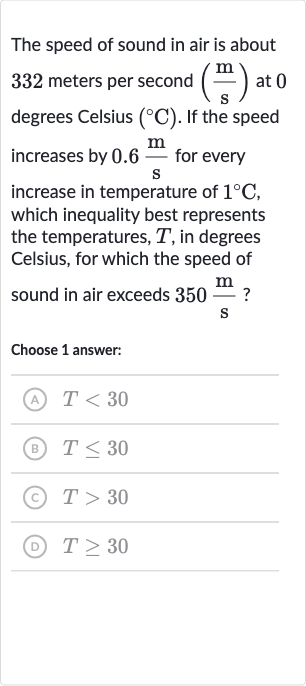AI tutor
Welcome to Bytelearn!
Let’s check out your problem:

The speed of sound in air is about at . If the speed increases by for every increase in temperature of , which inequality best represents the temperatures, , in degrees Celsius, for which the speed of sound in air exceeds ?Choose answer:(A) T < 30(B) (C) T > 30(D)
Full solution
Q. The speed of sound in air is about at . If the speed increases by for every increase in temperature of , which inequality best represents the temperatures, , in degrees Celsius, for which the speed of sound in air exceeds ?Choose answer:(A) (B) (C) (D)
- Given Information: We are given that the speed of sound in air at degrees Celsius is meters per second. We are also told that the speed increases by meters per second for every degree Celsius increase in temperature. We need to find the temperature at which the speed of sound exceeds meters per second. Let's denote the temperature in degrees Celsius as .
- Equation Setup: First, we need to set up an equation that relates the speed of sound to the temperature. The speed of sound at any temperature can be represented as , where is the speed of sound at degrees Celsius and is the increase in speed for degrees above degrees Celsius.
- Inequality Setup: Next, we want to find the value of for which the speed of sound exceeds meters per second. So, we set up the inequality 332 + 0.6T > 350.
- Isolate T: Now, we solve the inequality for T. Subtract from both sides to isolate the term with on one side of the inequality: 0.6T > 350 - 332.
- Divide by .: Perform the subtraction on the right side of the inequality: 0.6T > 18.
- Calculate T: Finally, divide both sides of the inequality by to solve for : T > \frac{18}{0.6}.
- Calculate T: Finally, divide both sides of the inequality by to solve for : T > \frac{18}{0.6}.Calculate the value of : T > 30.
More problems from Write two-variable inequalities: word problems
QuestionGet tutor help
QuestionGet tutor help
QuestionGet tutor help
QuestionGet tutor help
QuestionGet tutor help
QuestionGet tutor help
QuestionGet tutor help
QuestionGet tutor help
